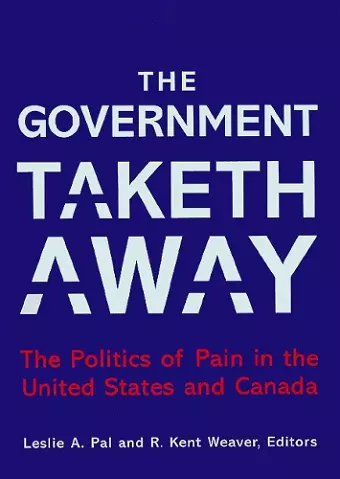The Government Taketh Away
The Politics of Pain in the United States and Canada
Leslie A Pal editor R Kent Weaver editor
Format:Paperback
Publisher:Georgetown University Press
Published:1st Apr '03
Currently unavailable, and unfortunately no date known when it will be back
This paperback is available in another edition too:
- Hardback£144.00(9780878409013)

A fine collection that deserves wide attention. The theoretical framework is systematic and thorough, the selection of policy fields is unusually logical, and the case studies are all both rich in substance and tightly focused on the common unifying questions about loss imposition and policy formation more generally. -- Robert Young, professor of political science and codirector of the Political Economy Research Group, University of Western Ontario
Democratic government is about making choices. Sometimes those choices involve the distribution of benefits. This work examines the repercussions of unpopular government decisions in Canada and the USA, the two great democratic nations of North America.Democratic government is about making choices. Sometimes those choices involve the distribution of benefits. At other times they involve the imposition of some type of loss-a program cut, increased taxes, or new regulatory standards. Citizens will resist such impositions if they can, or will try to punish governments at election time. The dynamics of loss imposition are therefore a universal-if unpleasant-element of democratic governance. The Government Taketh Away examines the repercussions of unpopular government decisions in Canada and the United States, the two great democratic nations of North America. Pal, Weaver, and their contributors compare the capacities of the U.S. presidential system and the Canadian Westminster system to impose different types of losses: symbolic losses (gun control and abortion), geographically concentrated losses (military base closings and nuclear waste disposal), geographically dispersed losses (cuts to pensions and to health care), and losses imposed on business (telecommunications deregulation and tobacco control). Theory holds that Westminster-style systems should, all things being equal, have a comparative advantage in loss imposition because they concentrate power and authority, though this can make it easier to pin blame on politicians too. The empirical findings of the cases in this book paint a more complex picture. Westminster systems do appear to have some robust abilities to impose losses, and US institutions provide more opportunities for loss-avoiders to resist government policy in some sectors. But in most sectors, outcomes in the two countries are strikingly similar. The Government Taketh Away is essential for the scholar and students of public policy or comparative policy. It is also an important book for the average citizen who wants to know more about the complexities of living in a democratic society where the government can give-but how it can also, sometimes painfully, "taketh away."
A remarkable volume ... First, the contributions contained within it are uniformly admirable as scholarship without being cursed with the obscurantist and obsequious lingo that too often renders such tomes either impenetrable or unappealing to the attentive and intelligent public. Second, they provide genuinely informative and compelling explanations of why public policy works (or doesn't work) the way it does. Finally, by giving sufficient detail about selected policy areas to make them intelligible, and then by adding informed reflections and cogent conclusions, they provide citizens, public officials and politicians with the intellectual tools necessary to comprehend problems that may be only apparently insoluble. The Innovation Journal
- Winner of Outstanding Academic Book of the Year 6 (United States)
- Winner of Outstanding Academic Book of the Year.
ISBN: 9780878409020
Dimensions: unknown
Weight: 612g
352 pages